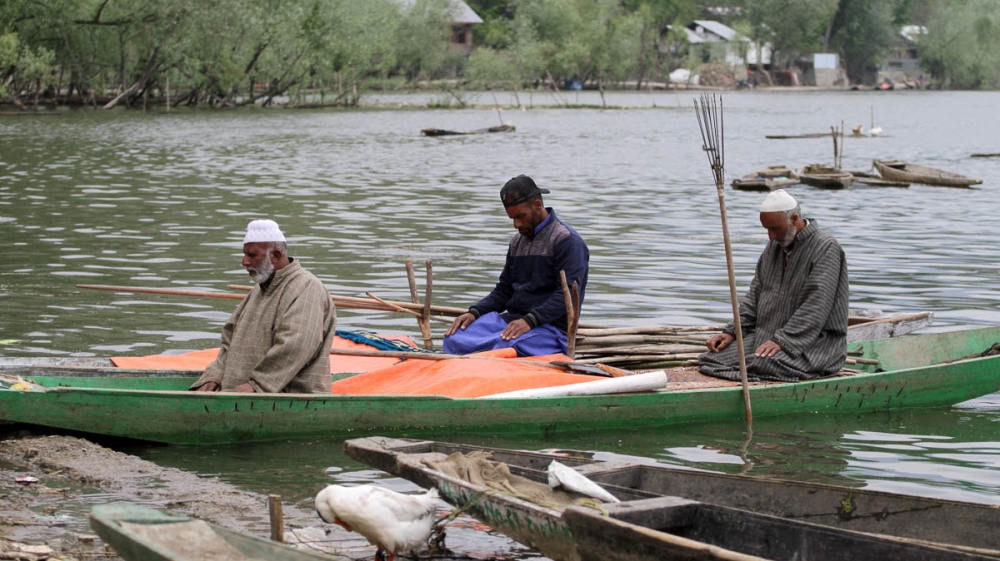It is a Ramadan like never before in the Muslim-majority region yet to recover from an earlier months-long shutdown.
Srinagar, Indian-administered Kashmir –After living through two back-to-back lockdowns that have devastated the local economy, people in Indian-administered Kashmir have settled for a quiet Ramadan.
The threat of the spread of the highly contagious coronavirus has emptied the usually overcrowded mosques in the picturesque, Muslim-majority Himalayan valley.
For many, the sight of deserted mosques in the current lockdown is a never-before experience.
“Our neighbourhood mosque is completely sealed. Everything is so heartbreaking but it is also a matter of life,” said Ghulam Ahmad, a 63-year-old retired government employee.
Ahmad lives in Gund Kaisar, a village in the northern district of Bandipora, which remains one of the most affected parts of Kashmir with more than 100 cases of COVID-19 disease.

Not a usual Ramadan
Gund Kaisar, like many villages of Bandipora, is under a strict lockdown to contain the spread of the infection that has brought the world to an unprecedented standstill.
Ahmad said his family made no usual preparations for Ramadan, which involves hectic shopping in the run-up to the fasting month.
“We could not even buy dates to break our fasts as the markets here are completely closed and not allowed to open,” he said. “The entry and exit to the village are also sealed.”
In the neighbouring village of Gund Jahangir, which has been declared a highly volatile “red zone” by the region’s administration, Ahmad said at least 35 families have been placed under quarantine.
“It is really painful how suddenly everything has happened,” he said. “Earlier, the village would be like a family and we would go around after iftar and have a chat and visit each other.”
The lockdown during Ramadan, Ahmad said, has subjected the families to immense difficulties.
Triggered by the spread of the novel coronavirus that originated in China and has infected more than three million people across the globe, the lockdown in Kashmir came as the disputed region still had not come to terms with a crippling earlier shutdown, which lasted nearly seven months.
The previous lockdown was imposed in August last year when the Indian government abrogated the region’s semi-autonomous status and divided the state into two federally-administered territories.

Kashmir’s economy suffers
The two lockdowns have brought Kashmir’s economy to a halt, with large scale employment-generating businesses, such as tourism, suspended for nine months now.
| https://imasdk.googleapis.com/js/core/bridge3.419.0_en.html#goog_1458837610Play Video |
| Kashmir shutdown: Farmers struggle to make a living |
The current lockdown was imposed in mid-March when the first coronavirus case was detected in the region.
Since then, the number of positive cases has increased to 500 as more than 60,000 people remain under various levels of observation, including home and hospital quarantine.
Half of the neighbourhoods in the main city of Srinagar, home to more than a million people, remain sealed. Only pharmacies have been exempted from the shutdown.
Coils of razor wire block the city’s main roads as hundreds of police and paramilitary troops stand guard at various checkpoints – a common sight in a region where an armed insurgency has raged for the last three decades.
In the area around 14th-century Jama Masjid, one of the oldest and largest mosques in Srinagar, residents say Ramadan feels incomplete without visiting their mosque.
“It feels like something is incomplete this month,” said Sajad Khan, who runs a shop outside the mosque where residents from nearby neighbourhoods would spend long hours during the holy month.
“There is no hustle and bustle to give you a feel of this month and make you forget for the time being all the troubles we go through,” he told Al Jazeera.

‘Testing time for people globally’
The two lockdowns have also taken a toll on the poorer sections of society, who have lost work in the last nine months.
Abdul Majid Mir, a daily wage earner from Payir village in south Kashmir’s Pulwama, says the latest lockdown has doubled his hardships.
“I continue to struggle to find any work and have to feed a family of six,” he told Al Jazeera. “Sometimes, I get work and have to settle for less money.”
